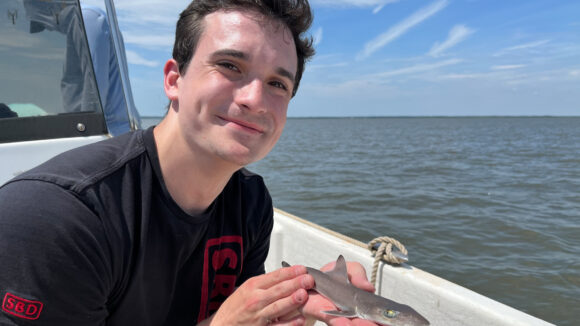
Salvatore Fricano’s curiosity about the ocean fueled his research on everything from ocean observation modeling technology in Antarctica to the effect of climate change on fish in the mid-Atlantic. Courtesy of Salvatore Fricano.
Salvatore Fricano is helping plan for the first worldwide navigation of a new underwater ocean glider
Salvatore Fricano grew up spending summers on the Jersey Shore, where the vastness of the ocean captivated his imagination.
“I just saw the horizon with nothing on it and it looked like an adventure waiting to happen,” he says. “I was interested in exploring it more than anything.”
Arriving at Rutgers, Fricano delved into the study of the ocean and its impact on the world during the second week of his first year. He had just finished his third “Introduction to Oceanography” class when he asked his professor, the late Gary Taghon, whether hurricanes in the Gulf of Mexico affect temperatures in Western Europe.
Impressed with the question, Taghon asked him to walk to the Department of Marine and Coastal Sciences building, where Fricano met two technicians who were scheduled to set sail the next morning and recover one of Rutgers’ autonomous underwater ocean gliders, which collect observational data about the ocean and serve as a critical tool in the monitoring and forecasting of storms.
At 6 a.m. the following day, Fricano headed to Atlantic City to join them on the mission.
“It was the most incredible experience I had had at that time in my life,” Fricano says. “It was so exciting to see all this research hands-on, especially since I had just been introduced to it and was participating in it the next day.”
 Fricano’s curiosity about the ocean fueled his research on everything from ocean observation modeling technology in Antarctica to the effect of climate change on fish in the mid-Atlantic. Many of his projects were developed in the class “Topics in Marine Science,” which he took seven times and led student teams on group projects.
Fricano’s curiosity about the ocean fueled his research on everything from ocean observation modeling technology in Antarctica to the effect of climate change on fish in the mid-Atlantic. Many of his projects were developed in the class “Topics in Marine Science,” which he took seven times and led student teams on group projects.
“He’s definitely one of the best students in our history,” says Scott Glenn, a distinguished professor of marine and coastal sciences who teaches the research class in the School of Environmental and Biological Sciences with two other faculty members. “We only have a few that take it every semester.”
Fricano is now leading a student team in the class to plan the logistics for the first worldwide navigation of a new underwater glider called Sentinel, which will make its maiden voyage at sea by the end of the summer. The three-year trip around the world will allow the newly designed glider to provide data on the ocean’s temperature – a major driver of hurricanes – and depth, measured down to 3,300 feet. The project is a collaboration between Rutgers’ Center for Ocean Observing Leadership and Teledyne Marine Webb Research, the company that developed the glider.
The longest route the previous model of the glider had been deployed on was from New Jersey to Spain in 2009.
“By having a global map of ocean temperatures across the world, you can create incredibly advanced models that predict storm intensities and trajectories,” Fricano says. “That can be the life-changing difference of, ‘Do we evacuate this community that’s about to get hit by a hurricane or not,’ and it can save lives.”
Fricano’s enthusiasm for the Sentinel project led his professors in the marine science research class to ask him and one other student to speak about the upcoming glider mission to two alumni clubs, in Sarasota and Fort Lauderdale, in March.
“We wanted the alumni to hear the story of how this Rutgers class is starting to plan the first glider mission to fly around the world,” Glenn says. “And we wanted to show them how our Rutgers undergraduates are growing into world leaders.”
Beyond his other work at Rutgers, Fricano was a research intern at the Jacques Cousteau National Estuarine Research Reserve, a 116,000-acre area in southeast New Jersey, last summer. He worked on a project that was exploring whether a recently decommissioned nuclear power plant on Oyster Creek had impacted certain species of larval fish during its operation. The study concluded that the hot water generated by the power plant had not independently had a significant impact on the fish in the creek.
When he is not studying the ocean, Fricano is in the water scuba diving. Over the past three years, he has become certified in rescue, advanced open water and scientific diving through courses he has taken at Rutgers.
“I thought this would definitely be an incredible way to start viewing the ocean from a different perspective – being in the water,” he says.
After graduating, Fricano hopes to earn a doctoral degree in oceanography, focusing on how global temperatures and human activity are impacting the biology of the ocean. His goal is to become a professor who can guide and mentor students, just as his professors did for him.
“Getting to become a professor, teach classes and pass that torch onto another generation and inspire them is a priceless life experience,” he says. “I see that as an incredible way to take the experiences that I’ve had here and give future students a similar incredible experience, knowing how that impacted me in such a positive way.”
This article originally appeared in Rutgers Today.

